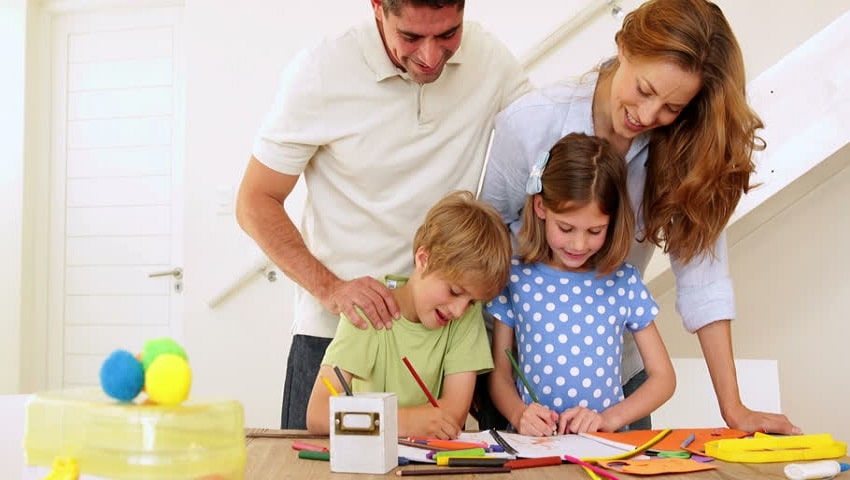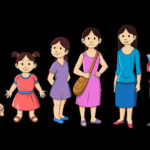Every parent wants to provide the best to their child but the social class of parents has a greater impact on the overall upbringing of the child and their performances at school and in life. The life of a child from the upper class looks more different than the life of the lower class. When it comes to educating and parenting a child, the social class of parents definitely contributes a lot.
Parents of all classes work hard to provide the best for their children. Be it the lower class or the upper class, the efforts are equal but the output may vary a little. For every parent, their child is special and a blessing, they are responsible to raise a good human being. Today’s parent understands the importance of providing good education to the kids and is focused to give them the best upbringing.
Role of Social Class in Parenting:
Parents’ values play an important part in their child-rearing practices, and child-rearing practices are closely related to the parents’ jobs. The parents’ job conditions provide the most significant influence on their children’s learning and behaviour. Thus, a determinant of class differences in parenting and learning is the structural position of the family as a whole, which influences both the individual variables such as age and sex of the parent, wealth, education and occupational status (with managerial and professional positions being more characteristic of middle-class families than working-class families); these structural positions influence such modifiable variables as attitudes and values.
Different social classes play different roles in parenting. Let us discuss each of these class parenting to give you a clearer idea.
1. Upper-Class Parenting Style
When it comes to parenting, upper-class families usually prefer to enroll a child in extracurricular classes, soccer, after-school programs and reading bedtime stories, and a lot more. The kids are well supervised and there are frequent conversations about their feelings and thoughts. The parents of kids in professional and management jobs tend to have a bigger influence on a child. The kids observe their parents and consider them as role models.
May upper-class parents are focused to provide special attention to their child, this is the reason they prefer to home school the kids. In the case of homeschooling, a particular curricular is followed and the kids are trained under expert educators. Upper-class kids learn trending technologies and education patterns, all thanks to expert guidance.
Parents are interested in following different teaching approaches like the Montessori method. This type of education involves a lot of practical learning, the child is motivated to learn the life skills in a fun and educational manner. From upper-class parentings, kids learn time management, specialization in skillset, and trending technology.
2. Middle-Class Parenting Style
Major the population falls under middle-class parenting, the parents are focused to provide the best in spite of monitory and other restrictions. When it comes to middle-class people, parents send their kids to a good private school where majorly ICSE or CBSE pattern is followed. A middle-class child does not get special attention but child is determined to perform the best.
All thanks to the middle-class parenting skills, parents want their kids to excel in their domain and stay ahead of them. Middle-class parenting cultivates moral values in the child and emphasizes the overall development of the child via various teaching methodologies. In this type of parenting, the primary focus is to raise a socially responsible child who is also well educated.
Under middle-class parenting, kids are treated similarly to adults so that they can have a sense of entitlement and social responsibilities. The role of the middle class includes parenting a lot because moral values are inculcated in the child during their growing years. It starts with sharing their belongings to helping each other in tough times.
Each and everything has a deep impact on the overall growth of the child. The kids are taught to negotiate and ask questions, the parents are more than happy to help the child when they need it the most.
3. Lower Class Parenting Style
The lower class people also take huge responsibility when it comes to raising their children well. They want their kids to be social and economically well unlike their parents. When it comes to parenting style, the parents hardly spend time with the child but the little time spend teaches a lot of things to the child.
In India, many low-class parents cannot afford expensive education, this is the reason major lower-class kids are enrolled in government schools. Thankfully, the government is offering the best and smart education choices to the students. In spite of their financial struggles, parents are working hard to provide the best education and upbringing to the child.
Moreover, the youth and current generation also encourage lower-class kids to study by conducting night classes, weekend classes, etc. When it comes to a lower-class parenting style, the parents want their children to inculcate life skills and stay independent by choosing the path of education.
4. Working Class Parenting Style
Working-class parents always pay attention to the freedom of their individual children and develop the quality to grow freely. This type of parenting is also known as natural parenting. The fact is that the parents are too busy in their daily routine that they don’t have time for their children so their children get enough time and freedom to roam here and there. There is no strict schedule to follow that makes the children do all their work by themselves and go out to play with friends without any restrictions of timing. They can watch TV as long as they want.
A working parent always orders their children to do this or that. They have the wrong infatuation that their children will naturally pick up adulthood soon.
Benefits Of Being In Each And Every Class
- The impact of each and every parenting style can easily be seen as it is clear on the outcomes of child development. The impacts of parenting styles on children.
- Upper-class parents generally raise their children to be obedient, self-confident but these children have a lack of happiness in their lives. They believe in social competence and have full confidence in themselves.
- Middle-class parents make their children happy in what they have, and make them capable of achieving anything in life, and moreover successful in life.
- Working-class parents have a low ranking in parenting as they don’t have enough time for their children to make their children solve their problems by themselves. They face a lack of happiness and love. These children are more likely to perform badly in school and behave wrongly with others.
- Lower-class children have self-confidence but they have lack self-control as they don’t have confidence in themselves and are poor in studies also. They always compare themselves with others and don’t prefer to do hard work.
- Good parenting is not about the present given to the child but it is the presence of parents when the child needs it the most. Whatever may be the social class of parents, all the parents are focused to provide the best to their children. The primary goal of all the parents is to raise an independent, skilled, responsible, intellectual, and good human.
- If the child is passionate about learning, whatever may be the class they can excel in their domain. Good parenting starts with teaching life skills and moral values to the kids. A hearty conversation and gentle parenting are a must. All you need is to treat the child with respect and love.
Impact of social class on child development
Social class and parenting go hand in hand. It is seen that upper working-class parenting styles tend to have a less authoritative parenting style. One important reason why this happens is that upper class parents are less able to adopt the more creative and resource-intensive authoritative parenting style. For example, upper-class parents emphasize conformity in their children and expect them to follow rules and behave appropriately because they do not feel confident in their abilities to handle stressful situations. Finally, these social class differences in values prescribe authoritarian and authoritative parenting styles respectively.
Parental warmth and support are key ingredients in children’s mental and emotional well-being. Parents who are authoritative, concerned, and responsive to the child feel confident they are helping their child build a strong sense of identity—a sense of who they are, who others see them to be, and how others see them. They want to help children learn from mistakes and make better choices, even if those decisions are unwise or inappropriate while authoritarian ones tend to be strict disciplinarians. In effect, authoritative parents want their kids to understand that they have rights with regard to their actions and behaviour, whereas authoritarian parents want total control over their children’s lives.
FAQ’s
1. In what ways does social class influence parenting?
Social class influences parenting because it determines what parents can think and do for their children. Sometimes a lower-class parent might want to raise their child with the best facilities and treatments however, they would be restricted with the financial aspect. This may make them think they aren’t fulfilling their responsibility as a parent appropriately.
2. How many different parenting styles exist?
Generally, there are four different types of parenting styles that exist which are commonly used in psychology. It includes permissive parenting style, authoritarian parenting style, authoritative parenting style, and neglectful parenting style. These upper-class parenting styles are categorised based on two aspects: demandingness and responsiveness. With their children, permissive parents have a higher probability to adopt a friendship position than a parental one. Parents choose to stay out of arguments, and they frequently give in to their kids’ requests upon class and parenting styles. Working-class parenting styles are caring, helpful, and frequently aware of their kids’ needs. They mentor their kids by having frank conversations with them on morals and logic. Parents that are neglectful spend little time with their kids and don’t enforce regulations very often. They may also be perceived as being cruel and heartless, yet this is not necessarily the case because they are frequently dealing with their very own problems. Authoritarian parents frequently communicate with their kids without seeking mutual connection or feedback in an effort to maintain total control.
3. What are the key ingredients in children’s mental and emotional well-being?
The mental and emotional well-being of a child is very important. The entire condition of their well-being further influences their actions, decisions and thinking throughout their lifetime. There are several factors that one should consider in children’s mental and emotional well-being. It includes love and care from family members, self-confidence, a safe environment, motivating friends and acquaintances, the opportunity to socialise with everyone in society, and proper guidance and teaching. Apart from these factors, there are various factors which will influence children’s well-being.
4. How does social class affect parenting styles in families?
Social class affects families to a great extent. The position of parents can affect their decision of how they create their family, raise their children, and what opportunities or threats they are exposed to. There are several factors in class differences in child-rearing as well that affect the family.
5. What role does social class play in child-rearing?
Social status significantly affects how children are raised. Working-class and lower-class parents frequently emphasise uniformity, which has an effect on how they rear their children. Usually, they adopt a more authoritative parenting style approach, wherein children are required to follow norms and figures of authority, and disobedience is punished. In contrast, middle-class and upper-class parents typically place high importance on independence. As a consequence, middle-class parenting styles frequently adopt a more lax approach to parenthood and inspire their children to dispute boundaries and challenge authority.
6. What is the role of social class and parenting styles?
Because of uneven exposure to privileges, wealth, and societal power, we refer to it as social stratification—social class exists. As a result, it significantly influences a person’s ability to obtain an education, the calibre of that learning, and the amount of success they may achieve. Additionally, it has an impact on one’s social network and the degree how which the individuals one knows can offer favourable chances for employment, political engagement and influence, or even longevity and health span, among various other things
Also read:
- Baby Monitors with Noise Monitoring: How They Work and Why They Matter - October 2, 2025
- Attachment Parenting Guide: Principles, Practices, and What to Expect - September 9, 2025
- Understanding Your Baby’s Cry: A Parent’s Mini Guide - June 23, 2025
- Bottle vs. Breastfeeding: What Works for You and Your Baby - June 18, 2025
- 10 Yoga Poses For Kids at Home: Benefits Of Yoga For Kids - June 12, 2025
- Parenting Guide to Child Development: Key Milestones from Birth to 10 Years - June 4, 2025
- Summer Vacation Plans Ideas with Kids - May 27, 2025
- Nutritious Dried Fruit Treats for Toddlers (16–24 Months) - May 25, 2025
- Importance of Screen Time Management for Kids - May 24, 2025
- The 6 Most Common Pregnancy Concerns First-Time Moms Have - May 23, 2025













